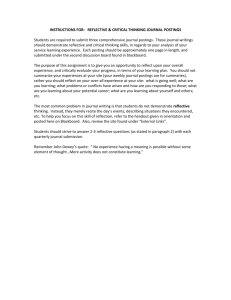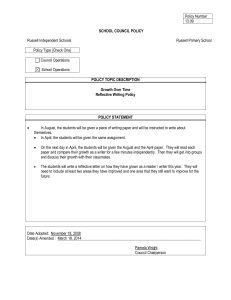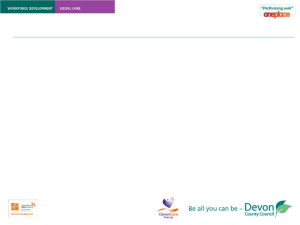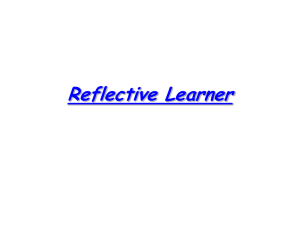best practice guidelines for reflective supervision/consultation
advertisement
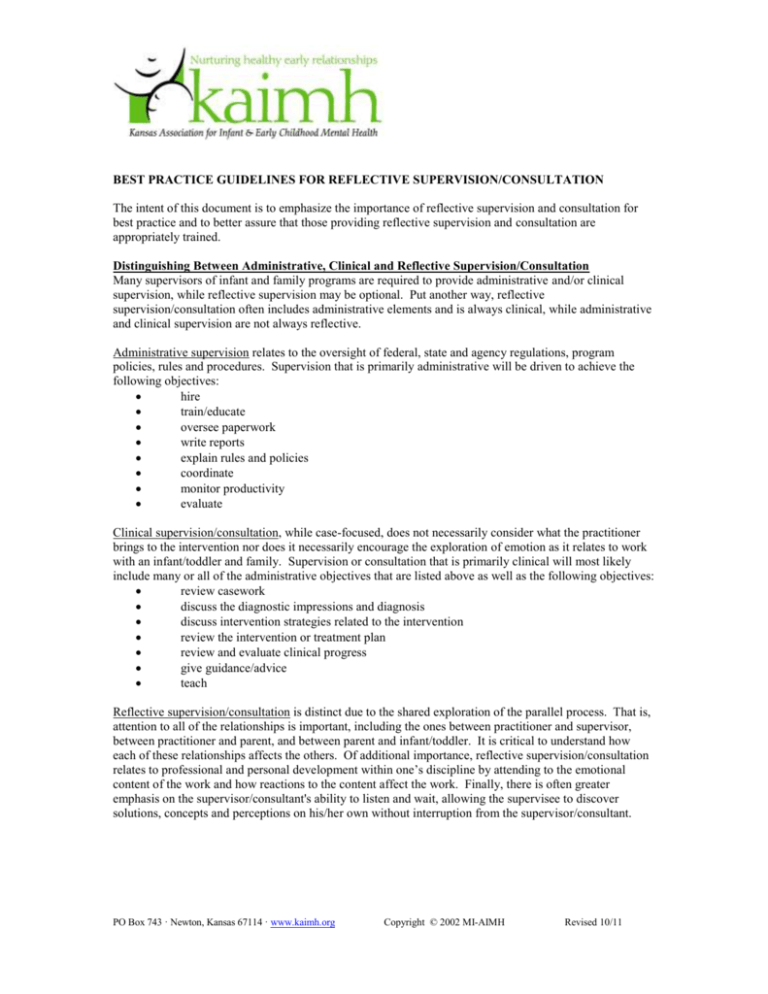
BEST PRACTICE GUIDELINES FOR REFLECTIVE SUPERVISION/CONSULTATION The intent of this document is to emphasize the importance of reflective supervision and consultation for best practice and to better assure that those providing reflective supervision and consultation are appropriately trained. Distinguishing Between Administrative, Clinical and Reflective Supervision/Consultation Many supervisors of infant and family programs are required to provide administrative and/or clinical supervision, while reflective supervision may be optional. Put another way, reflective supervision/consultation often includes administrative elements and is always clinical, while administrative and clinical supervision are not always reflective. Administrative supervision relates to the oversight of federal, state and agency regulations, program policies, rules and procedures. Supervision that is primarily administrative will be driven to achieve the following objectives: hire train/educate oversee paperwork write reports explain rules and policies coordinate monitor productivity evaluate Clinical supervision/consultation, while case-focused, does not necessarily consider what the practitioner brings to the intervention nor does it necessarily encourage the exploration of emotion as it relates to work with an infant/toddler and family. Supervision or consultation that is primarily clinical will most likely include many or all of the administrative objectives that are listed above as well as the following objectives: review casework discuss the diagnostic impressions and diagnosis discuss intervention strategies related to the intervention review the intervention or treatment plan review and evaluate clinical progress give guidance/advice teach Reflective supervision/consultation is distinct due to the shared exploration of the parallel process. That is, attention to all of the relationships is important, including the ones between practitioner and supervisor, between practitioner and parent, and between parent and infant/toddler. It is critical to understand how each of these relationships affects the others. Of additional importance, reflective supervision/consultation relates to professional and personal development within one’s discipline by attending to the emotional content of the work and how reactions to the content affect the work. Finally, there is often greater emphasis on the supervisor/consultant's ability to listen and wait, allowing the supervisee to discover solutions, concepts and perceptions on his/her own without interruption from the supervisor/consultant. PO Box 743 · Newton, Kansas 67114 · www.kaimh.org Copyright © 2002 MI-AIMH Revised 10/11 The primary objectives of reflective supervision/consultation include the following: form a trusting relationship between supervisor and practitioner establish consistent and predictable meetings and times ask questions that encourage details about the infant, parent and emerging relationship listen remain emotionally present teach/guide nurture/support apply the integration of emotion and reason foster the reflective process to be internalized by the supervisee explore the parallel process and to allow time for personal reflection attend to how reactions to the content affect the process Reflective supervision/consultation may be carried out individually or within a group. For the purposes of this document, reflective supervision/consultation refers specifically to work done in the infant/family field on behalf of the infant/toddler's primary caregiving relationships. Reflective supervision/consultation may mean different things depending on the program in which it occurs. A reflective supervisor or consultant may be hired/contracted from outside the agency or program, and may be offered to an individual or group/team in order to examine and respond to case material. If the supervisor or consultant is contracted from outside the agency or program, he or she will engage in reflective and clinical discussion, but administrative objectives only when it is clearly indicated in the contract. If the reflective supervisor/consultant operates within the agency or program, then he/she will most likely need to address reflective, clinical and administrative objectives. When discussions related to disciplinary action need to occur, it is the direct supervisor who addresses them. When the direct supervisor is also the one who provides reflective supervision, some schedule a meeting separate from the reflective supervision time. Others choose to address disciplinary concerns during the regular reflective supervision meeting. Disciplinary action should never occur within a group supervisory/consultation session. In all instances, the reflective supervisor/consultant is expected to set limits that are clear, firm & fair, to work collaboratively and to interact and respond respectfully. In sum, it is important to remember that relationship is the foundation for reflective supervision and consultation. All growth and discovery about the work and oneself takes place within the context of this trusting relationship. To the extent that the supervisor or consultant and supervisee(s) or consultee(s) are able to establish a secure relationship, the capacity to be reflective will flourish. “When it’s going well, supervision is a holding environment, a place to feel secure enough to expose insecurities, mistakes, questions and differences.” Rebecca Shahmoon Shanock (1992) Supervision is “the place to understand the meaning of your work with a family and the meaning and impact of your relationship with the family.” Jeree Pawl, public address “Do unto others as you would have others do unto others.” Jeree Pawl (1998) (Publication written by the Michigan Assn. for Infant Mental Health, 2010) PO Box 743 · Newton, Kansas 67114 · www.kaimh.org Copyright © 2002 MI-AIMH Revised 10/11


